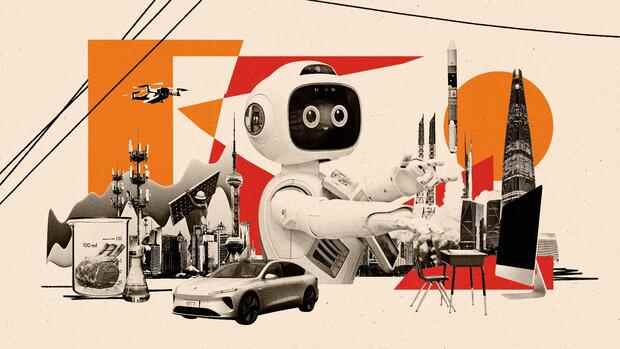Beijing Where is China’s head of state and party leader Xi Jinping steering the world’s second largest economy? This question is not only being asked by the global political elite at the G20 summit in Bali.
Uncertainty has grown noticeably among the once influential leaders of China’s private corporations after the party congress, at which Xi secured his unrestricted power for years to come. There is fear that the ideologically driven leader will tighten his stranglehold on the private sector.
Business leaders watched in horror as Xi coldly dumped more liberal-minded comrades and rallied around him like-minded loyalists. With horror they counted how he professed Marxism a good two dozen times in his speech. They shuddered at his calls for more party influence in non-state enterprises.
Tencent and JD.com with government partners
Recently, a striking coincidence caused a stir not only in China’s battered private sector. The state-owned telecoms giants, which were only recently delisted from US stock exchanges, appear to be increasingly grabbing parts of the private companies.
Top jobs of the day
Find the best jobs now and
be notified by email.
According to a document recently released by the anti-monopoly agency at the Ministry of Market Regulation, China Unicom established a joint venture with social media group Tencent. Tencent is the operator of the super app WeChat, which has been developing into a total monitoring and control instrument at least since Corona. Almost at the same time, it was announced that China Mobile was entering into a strategic partnership with the second-largest online retail platform, JD.com.
Observers fear this is just the beginning. They expect more similar deals, with big tech being assigned a state partner to increase scrutiny. As an ideology-driven form of public-private partnerships with Chinese characteristics. The party press, however, hailed the China Unicom-Tencent joint venture as an important step forward in the “mixed-ownership reforms.”
China’s rulers have recently been moderate in foreign policy. In China, on the other hand, there are fears that communist economic policy will be tightened.
(Photo: AP)
Some are reminded of the socialist “reform” of the private sector in the early 1950s under state founder Mao Zedong. Shortly after the founding of the People’s Republic in 1949, private companies were still desirable, also because they contributed to the reconstruction after the civil war. But then Mao attested to the failure of the private sector and from then on relied on state capitalism. Is the communist state eating its private-sector children again?
For some time now, China’s rulers have been tightening the reins on private companies large and small to curb the “disorderly expansion of capital.”
Read more issues of our Asia Technonomics column here:
Brutal examples were made of the Alibaba financial service provider subsidiary Ant and the driving service provider Didi, and an entire industry such as private online tutoring platforms was practically dissolved.
The bosses of the Internet companies practiced kowtowing and, in anticipatory obedience, “donated” billions for the benefit of the people and for the alleged “prosperity for all” theory of Xi Jinping.
Xi Jinping’s great role model Mao
The just-released so-called Hurun list of the biggest philanthropists is headed by JD.com founder Richard Liu, Meituan founder Wang Xing, and Xiaomi founder Lei Jun, all of whom have pledged the equivalent of $2 billion or more to social causes since April 2021.
Quite a few successful entrepreneurs are now activating their exit strategy and trying to get their wealth and family out of the country. Because at the latest since Xi Jinping had his predecessor Hu Jintao removed from the podium in public at the party congress, it must have become clear to everyone: the era of Deng Xiaoping, who once invented the market economy with Chinese characteristics, is over.
It is to be feared that it will be replaced by Xi’s pure teachings of Marxism-Leninism with Chinese characteristics, entirely based on the great example of Mao Zedong.
In the Asia Techonomics column, Nicole Bastian, Sabine Gusbeth, Dana Heide, Martin Kölling and Mathias Peer take turns commenting on innovation and economic trends in the world’s most dynamic region.
More on this: President Xi’s claims to omnipotence are a disaster for Europe’s companies.
